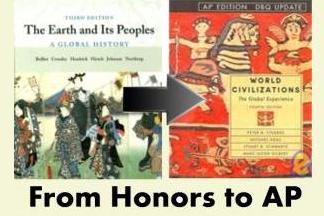You’re just beginning to read your twentieth page from the textbook. Almost done! With the reading, that is. Now you have essay prompts to complete, and for some kids, more document based questions are coming your way.
This scenario confronts AP World History students on a nightly basis. And it’s safe to say that similar workloads are pushed onto all AP students, not just those taking world history.
It’s common knowledge that any AP class requires dedication, motivation, and a great deal of time. The vast majority of students enrolled in AP classes have taken Honors classes in their previous years. However, while taking Honors prepares you much more than taking a non Honors class, I do not believe that it adequately prepares you.
In Freshman Pre-AP, now called Honors, World History, I believed I had a great work load, completing “SPEARS,” outlines, and Cornell Notes from the textbook on a regular basis. However, compared to the 20 pages of reading one does for AP World History, along with paragraph prompts that require much analyzing and depth, it was nothing. While I believe AP classes are something everyone can do and complete if they manage their time, I do not believe that Pre-AP/Honors focused on the same things that students need to know for AP. Sophomore AP student Natalie Rasmus believes “last year they taught us to read and analyze, however there was a very small focus on writing and this year all we do is write essays and long paragraphs for our homework assignments.”
The transition from Honors English to AP Language is not an easy one either. Junior Jonathan O’Connor found that “Honors doesn’t really help you for AP, all that matters is what you do on your own and how the student studies.”
One of the few students who chose to take an AP class without taking Pre-AP/Honors, junior Spencer Gorham said he “does not feel in any way ill-equipped not taking Pre-AP/Honors the year before.” No matter the teacher, the curriculum itself does not allow the students to entirely prepare for the next year and go into it knowing what to expect.


